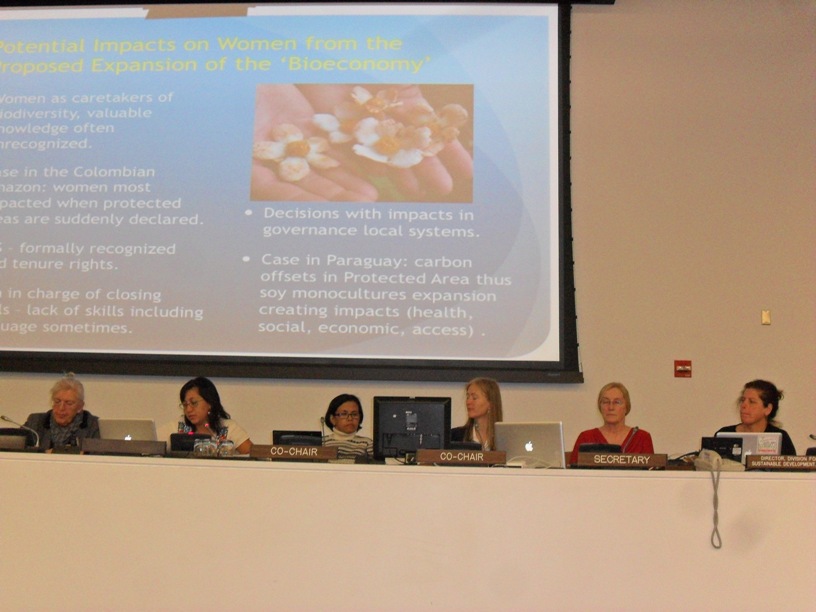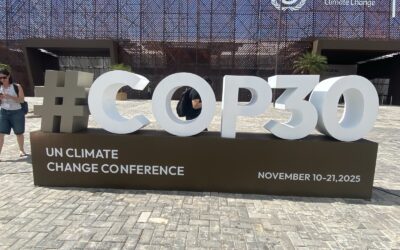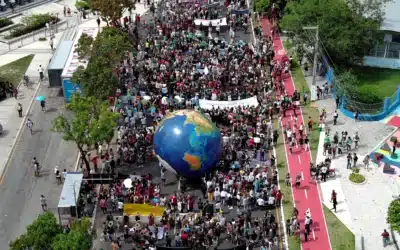(cross-posted) Keith Brunner from Gears of Change Youth Media Project reports back from the side event “Women’s critical perspectives on the ‘green economy” carried out during the UN Rio+20 intercessional (March25-27) at the UN headquarters in New York.
The “green economy” will be a shot in the arm for ailing global markets- a rush of new commodities and investment frontiers, packaged neatly within a UN mandate for “sustainable development.” But how will it affect those who are already the most marginalized?
This afternoon I attended an event entitled “Women’s critical perspectives on the ‘green economy.” Participants painted a picture of a future far different from the heady visions on display at the corporate side events. The “green economy,” according to the panelists, will exacerbate already growing gender violence, urban migration and loss of traditional skills and knowledge amongst women, with women in the Global South being hit the hardest.
Isis Alvarez, with Global Forest Coalition, began the panel by noting that: “Biodiversity and the environment turned into marketable goods seems to be the current approach to conservation. And markets necessarily need privatization. But what are the consequences for women, if a resource which used to be accessible is now privatized?”
She continued: “Women usually provide their families with key resources for their livelihoods, such as fuelwood, medicinal plants, fodder, food, nuts, they collect seeds, so biodiversity means everything to them, as they depend on the non-monetary benefits of biodiversity.”
Alvarez noted that for the majority of Payment for Ecosystem Services schemes, such as forest carbon schemes under the Reducing Emissions from Deforestation and forest Degradation program, men often negotiate the deals, and women, due to language skills and other reasons, are left out of the process. Women cannot assume the high costs of certifying forests and other ecosystems through these schemes.
As well, when forest-dependent peoples are excluded from traditional territories due to newly implemented conservation zones, it is often the women- especially single women- who must move to the cities to find work, which can mean prostitution in some areas.
Rachel Smolker of Biofuelwatch in the US noted that bioenergy- referring not just to ethanol and biodiesel, but to the “entire replacement of petroleum and uses of fossil fuels by plant material”– is central to the green economy agenda. Governments like the EU, and commercial sectors such as the aviation industry, are setting bioenergy mandates to meet “renewable” energy targets. This rapidly expanding field, investment in which overwhelms the solar and wind sector, is already driving conflict between traditional uses, such as rural cookstoves, and new commercial and industrial uses.
Smolker noted that: “The vision that you see, for example being portrayed by the Department of Energy in the United States, is that we have massive biorefineries that bring in plant material from the surrounding area, produce energy, electricity, plastics, pharmaceuticals, all of those things, in one gigantic consolidated biorefinery. So where is all that plant material supposed to come from? Most of the biomass that is available on the planet is actually in the Global South. And thats why we see the European Union now importing woodchips and wood pellets from Brazil and from other South American countries, because they don’t have enough where they exist, they have to get it from somewhere else, and this is what’s driving land-grabs for bioenergy.”
She continued: “Women are the most vulnerable to the land-grabs that result from this increased demand for wood. Women are the main food producers, they’re responsible for children, they’re the first to go hungry when food shortages occur, they have less secure tenure over their lands, they have less decision-making over their lands, they have less of a role in the cash economy and are often viewed as cheap labor. Women are the most vulnerable.”
Neth Dano, from the Philippines with the research group ETC Group, addressed one form of bioenergy, biochar. “Biochar mainly relies upon things that they call waste, farm waste, like rice husk. But rice husk is never considered waste in a farm-based operation. Rice husk is the fertility. It is the fertilization for the soil. Rice husk, in many households, is the fuel that they use for cooking, or maybe for heating in some parts. So you have rural women directly competing with the “biomassters”, who are aiming to concentrate the extraction, to concentrate the transport from the source to a factory to centrally process this biomass, this ‘waste,’ into energy that will fuel unsustainable production and consumption patterns.”
Dano also addressed the gendered impacts resulting from the introduction of new technologies, a major piece of the “green economy” agenda. She noted that:
“The Green Revolution technologies, from pesticides, fertilizers, to mechanized farming, have actually marginalized women- have actually made women invisible in the agricultural sector. And when you think of a farmer under the Green Revolution, it’s one who is macho, using mechanized tools, using pesticides and new seeds developed by industry, and yes, using fertilizers and taking advantage of irrigation built by men. So we also have to raise critical questions on technology- the nature of technology, the patriarchy that is bred and also facilitated by technology in recent history. You don’t have to look far on how technology designed by men, for men, has actually reaffirmed and strengthened patriarchy.”
Dano mentioned that “in the green economy, we hear a lot of words, of rhetoric about clean technology, green technology, environmentally sound technology, but none of them are actually offering a common definition, because there is none.” She continued: “There is no mechanism to assess, no mechanism to monitor, no mechanism to verify what we are talking about when we say clean technologies, environmentally sound technologies, green technologies. As Pakistan said this morning, you just have to add the word “green” and magically it becomes environmentally sound.”
Dano noted that nanotechnology, which takes place at one billionth of a meter, has already been introduced into consumer products in some countries. She pointed out that “beyond our will, beyond our knowledge, 1,300 products in North America are products of nanotechnology, without us knowing that we are eating, that we are using in our faces, in our skin, everywhere, nanoproducts that are not regulated, that are not meeting any standard because there is no standard- and nobody’s looking into this.”
Dano also drew attention to a paragraph in the Zero Draft text proposing a moratorium on ocean fertilization, a form of geoengineering, which has been introduced by the G77 and is supported by the EU, but opposed by the US, who states that “there is no room to discuss any particular technology in this discussion, particularly geoengineering.” With billionaires such as Bill Gates sinking money into geoengineering research, who will own and control these climate-altering technologies, and who will have access to participate in decisions to use them?
So how are women responding? It’s obvious that even if passed, institutional solutions to some of these issues such as an effective and participatory technology assessment mechanism would not eliminate the patriarchy. And it seems that even these proposals stand little chance of getting passed, as delegates with dollar signs in their eyes kill any proposals that could be seen as hindering the profit-making opportunities of multinational corporations.
At the end of her presentation, panelist Rachel Smolker offered a story from a few years ago, whereby local women affiliated with the international peasant farmers organization La Via Campesina actually uprooted an entire plantation of eucalyptus trees which had been a part of a land dispute in their community. Maybe there’s something to that story that we can take away.





